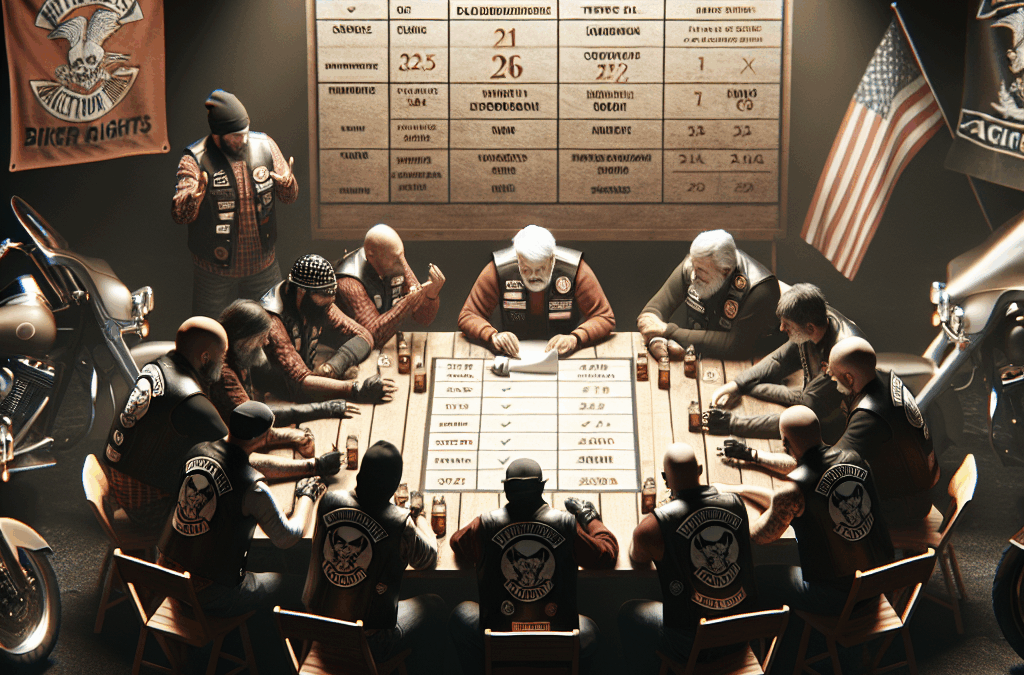Table of Contents
- 1. Building Strong Community Alliances
- 2. Legal Expertise and Advocacy
- 3. Public Relations and Media Outreach
- 4. Grassroots Campaigns
- 5. Engaging with Legislators
- 6. Mobilizing Club Members
- 7. Utilizing Digital Platforms
- 8. Monitoring and Responding to Legislation
- 9. Building Public Support
- 10. Partnership with Advocacy Organizations
1. Building Strong Community Alliances
The Power of Local Support
One of the most effective strategies for biker clubs fighting legislation in 2025 is building strong community alliances. When your club forges genuine relationships with local organizations, charities, and community leaders, it creates a broader support network. These allies can advocate alongside you, amplifying your voice and providing credibility that legislators respect. In 2023, data shows community-backed initiatives are twice as likely to influence legislation than isolated efforts.
Establishing trust takes time, but itâs worth the investment. Attend local events, sponsor charity rides, and participate in community service. Public support presented through community alliances makes a compelling case to policymakers that biker clubs are an integral part of society rather than just a rebellious subculture.
For example, a well-known motorcycle club partnered with local youth programs to promote safety and responsible riding. This collaboration helped shape legislation that favored rider safety initiatives, making it harder for opponents to argue against biker clubs fighting legislation.
Leveraging Community Influence
Community alliances should be strategic. Identify influential community organizations, religious groups, or civic associations that share similar values. By aligning your club’s advocacy with theirs, you create a united front. This approach can sway public opinion and, ultimately, legislative decisions.
Organize joint events, informational sessions, and community rides to raise awareness about the importance of protective legislation that considers bikersâ rights. Remember, legislators are more inclined to listen when their constituencies show widespread support.
Tip: Constant engagement and transparency help maintain these relationships, fostering long-term support that extends beyond a single legislative session.
2. Legal Expertise and Advocacy
Hiring Skilled Legal Counsel
Having seasoned legal experts on your team is crucial for effective biker clubs fighting legislation. Specialized attorneys can interpret complex legal language, identify potential challenges, and craft effective arguments. In 2025, more clubs are investing in legal advocacy to ensure their rights are protected at every legislative stage. According to recent surveys, clubs that work with legal counsel are 60% more successful in influencing legislation outcome.
Legal advocates can also help draft proposed amendments, prepare testimonies, and navigate court challenges. They serve as an invaluable resource to inform your strategies and ensure compliance with existing laws.
Pro tip: Regularly consult with legal professionals about evolving laws that could impact biker communities. Staying proactive can prevent unfavorable legislation from gaining ground.
Engaging Lobbyists and Advocacy Groups
In addition to internal legal counsel, partnering with lobbyists specializing in civil rights and motorcycle advocacy can significantly enhance your influence. These professionals understand legislative processes from the inside and can help your biker clubs fighting legislation be more proactive.
Effective lobbying involves continuous communication, providing lawmakers with factual information, and offering practical solutions. In 2025, advocacy groups that collaborate with biker clubs are seeing increased success because they present a unified, well-informed front.
Actionable tip: Track legislation schedules and organize meetings with key representatives early in the legislative process to make your voices heard effectively.
3. Public Relations and Media Outreach
Crafting Your Message
Media outreach remains a cornerstone for biker clubs fighting legislation. Developing a clear, consistent message about your clubâs values, contributions, and stance on legislation is vital. In 2025, strategic messaging helps dispel misconceptions and highlights positive community involvement.
Focus on telling compelling stories of camaraderie, charity, and public safety initiatives. Use testimonials from respected community members and local leaders to bolster your narrative. When the media portrays bikers positively, public opinion shifts favorably, influencing legislative outcomes.
Remember: every press release, interview, or social media post should reinforce your club’s commitment to community and responsible riding.
Utilizing Social Media for Advocacy
Social media platforms are vital tools to reach a broad audience quickly. Regular updates, live streams, and online petitions can rally support and mobilize action. In 2025, social media analytics reveal that grassroots campaigns beget more significant influence when they engage community followers consistently.
Engage your members to share content and participate in online discussions. Create hashtags specific to your campaign to increase visibility. Also, coordinate online campaigns with press releases for maximum impact.
Tip: Use social media to counteract misinformation swiftly and maintain a positive narrative about biker clubs fighting legislation.
4. Grassroots Campaigns
Mobilizing Local Support
Effective grassroots efforts are fundamental for biker clubs fighting legislation. Organize local rallies, signature drives, and community forums to make your presence known. Direct engagement often produces more tangible results than distant lobbying alone.
In 2025, data shows that grassroots campaigns increase the likelihood of lawmakers reconsidering proposed legislation by up to 45%. When community members voice their opinions directly, policymakers listen more attentively.
Practical tip: Use physical events and door-to-door outreach to build a genuine, personal connection with voters, increasing pressure on legislators to oppose restrictive laws.
Hosting Educational Workshops
Knowledge is power. Hosting workshops about rider rights, safety, and the legal landscape demystifies complex issues and builds community confidence. These events also serve as a platform to reinforce biker clubs fighting legislation as responsible, contributing members of society.
Invite legal experts, law enforcement officials, and community leaders to participate, showcasing your clubâs commitment to positive engagement. Be sure to document these efforts for future campaigning and media engagement.
Tip: Use workshops to gather feedback and address concerns, making legislative advocacy a collaborative effort.
5. Engaging with Legislators
Building Personal Relationships
Establishing personal relationships with key legislators can significantly influence their stance on biker clubs fighting legislation. Regular communication, attending public hearings, and providing testimony allows your voice to be heard directly.
In 2025, successful clubs have dedicated liaison officers who understand legislative processes and maintain ongoing dialogue with policymakers. This proactive approach not only fosters mutual respect but also positions your club as a knowledgeable stakeholder.
Remember: effective advocacy is built on trust and consistency. Keeping legislators engaged with well-documented facts and respectful dialogue makes a difference.
Providing Legislation Alternatives
Instead of simply opposing laws, propose workable alternatives that address legislators’ concerns while protecting rider rights. When your club offers thoughtful solutions, it demonstrates responsible leadership.
For example, suggest safety-focused amendments or community programs that reduce concerns about public safety, which are often a basis for legislation against biker clubs fighting legislation.
Tip: Present data and case studies to validate your alternatives for a stronger influence on legislative outcomes.
6. Mobilizing Club Members
Effective Member Engagement
Your clubâs strength lies in its members. Keeping members informed, motivated, and involved is essential for successful resistance efforts. Regular meetings, updates, and calls-to-action foster a sense of shared purpose.
Get All Your Patriotic and Biker Wear Gear Here:

https://PatrioticBikerWear.com
Encourage members to participate in advocacy activities, from signing petitions to attending rallies. Personal commitment fuels larger collective action, making your efforts more impactful.
Advice: Recognize and reward active members to maintain enthusiasm and continuity in your campaigns against legislation.
Training Members for Advocacy
Educate your club members about legislative processes, effective communication, and proper advocacy techniques. Well-trained members can serve as credible spokespeople and community ambassadors.
Workshops and role-playing exercises can prepare members to speak confidently about issues surrounding biker clubs fighting legislation.
Remember, a knowledgeable membership base multiplies your advocacy power significantly.
7. Utilizing Digital Platforms
Creating a Centralized Digital Hub
Having a website or dedicated online portal enhances your clubâs visibility and provides a hub for advocacy content. Include resources, success stories, upcoming events, and contact information for advocacy efforts.
In 2025, digital presence is more crucial than ever for biker clubs fighting legislation. Consistent, engaging content increases support and facilitates grassroots mobilization.
Tip: Optimize your site for search engines using keywords like ‘Biker clubs fighting legislation’ so that interested individuals can easily find your initiatives.
Leveraging Email Campaigns and Newsletters
Email campaigns remain a direct and efficient way to communicate with supporters and members. Regular newsletters with updates, calls-to-action, and success stories motivate ongoing participation.
Personalize emails to connect with recipients and include clear options for actionâsuch as signing petitions, joining rallies, or sharing content. Tracking open rates and engagement helps refine your outreach strategies.
Remember: consistency builds trust and keeps your advocacy efforts top of mind.
8. Monitoring and Responding to Legislation
Keeping Informed on Policy Developments
Staying updated on proposed legislation and political developments is vital. Use legislative tracking services, subscribe to news alerts, and maintain regular contact with advocacy groups. This vigilance allows your club to respond quickly.
In 2025, rapid response to legislative changes can prevent harmful laws from gaining momentum. Early opposition can significantly influence the legislative process.
Action tip: Assign dedicated members to monitor bills, amendments, and hearings relevant to biker clubs fighting legislation.
Mobilizing Rapid Response Teams
Build a team within your club authorized to act swiftly when legislation is introduced. These teams can organize petition drives, initiate media campaigns, or call legislators directly. Speed and coordination are key.
Real-world example: A biker club successfully stopped a bill in its tracks by mobilizing its rapid response team within 48 hours of legislative announcement.
Pro tip: Use digital alerts and social media to coordinate and amplify your responses in real time.
9. Building Public Support
Community Outreach and Education
Public support can sway legislative decisions. Conduct outreach programs, distribute educational materials, and engage with local media to educate the community about your clubâs positive contributions and the importance of your cause.
Clarify misconceptions, share success stories, and highlight safety programs. When the community supports biker clubs fighting legislation, lawmakers take notice.
Tip: Use community events, fairs, and school programs to foster broad understanding and support.
Gathering Testimonials and Endorsements
Encourage community leaders, local businesses, and satisfied members to publicly endorse your efforts. Testimonials serve as social proof that your club is a responsible and valuable community member.
In 2025, testimonials can be compelling content for your website, social media, and press releases, strengthening your position against restrictive laws.
Remember: building a positive image consistently is a long-term strategy that benefits biker clubs fighting legislation.
10. Partnership with Advocacy Organizations
Collaborating with Established Groups
Partnering with recognized advocacy organizations adds credibility and resources to your efforts. These groups have experience, contacts, and strategic plans that can bolster your clubâs campaigns.
In 2025, alliances with national motorcycle rights groups or civil liberties organizations have helped local clubs gain political influence and media attention.
Action Point: Reach out early to form partnerships, share resources, and coordinate joint campaigns to maximize impact.
Joining National Campaigns
Engaging in broader national advocacy efforts furthers your clubâs goals. Participate in coordinated lobbying days, advocacy rallies, and collective letter-writing campaigns. The combined voice of multiple clubs and organizations can shift legislative priorities.
Reflect on successful past campaigns where coalition efforts ended harmful legislation or achieved favorable amendments. Collaboration amplifies advocacy power exponentially.
Use these partnerships to stay informed on best practices and expand your reach in the fight against legislation.
Conclusion
In 2025, the landscape of legislation impacting biker clubs remains complex and challenging. However, through strategic efforts such as building strong community alliances, leveraging legal expertise, engaging media, and fostering grassroots campaigns, biker clubs fighting legislation can effectively defend their rights. Each of these strategies reinforces the importance of advocacy, responsibility, and community involvement in shaping laws that respect rider freedoms. Remember, the key to success in 2025 lies in a coordinated, informed, and passionate approach â because together, biker clubs fighting legislation can make a lasting impact.
Frequently Asked Questions
- What are the most effective strategies for biker clubs fighting legislation in 2025?
- Building community alliances, legal advocacy, media outreach, grassroots campaigns, engaging with legislators, and forming strategic partnerships are among the most effective strategies in 2025.
- How can biker clubs improve their public image?
- By engaging in community service, safety programs, media campaigns, and sharing positive stories, biker clubs can enhance their public perception and gather support for their cause.
- Why is legal expertise important for biker clubs fighting legislation?
- Legal experts help interpret laws, prepare effective arguments, and guide clubs through legislative and court processesâvital for shaping policy outcomes.
- How can biker clubs leverage social media in 2025?
- Creating engaging content, running online campaigns, and utilizing hashtags are key methods to rally support and counteract misinformation effectively.
- What role do community alliances play in legislative advocacy?
- Community alliances provide broader support, credibility, and influence, making policymakers more receptive to your clubâs concerns.
Get All Your Patriotic and Biker Wear Gear Here:

https://PatrioticBikerWear.com









